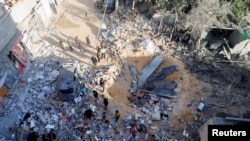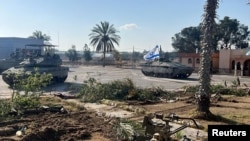The Israeli military said Wednesday it has reopened the Kerem Shalom crossing into Gaza, but the United Nations said no humanitarian aid had yet entered the Palestinian territory as no one was present to receive it after workers left the area because of Israeli attacks near there.
The Kerem Shalom crossing was closed last weekend after a Hamas rocket attack killed four Israeli soldiers. On Tuesday, an Israeli tank brigade seized the nearby Rafah crossing between Gaza and Egypt, also forcing its closure.
The two crossings are the main points of entry for humanitarian aid -- food, medicine and other supplies -- into Gaza, the narrow territory along the Mediterranean Sea where 2.3 million Palestinians live. More than half that population crowded into the southern reaches of Gaza to escape fighting in the northern part of the enclave during the earliest weeks of the seven-month-long Israel-Hamas war.
Israeli attacks on southern Gaza did not appear to be the start of the full-scale invasion of the city of Rafah that Israeli Prime Minister Benjamin Netanyahu has repeatedly promised to root out four remaining Hamas battalions there.
But aid officials have warned that any prolonged closure of the two crossings could cause the collapse of aid operations in Gaza, where the U.N. says a "full-blown famine" is already under way in the north.
The Rafah crossing has been vital for humanitarian aid since the start of the war in October and is the only place that people can enter and exit Gaza. Kerem Shalom is Gaza's main cargo terminal.
Meanwhile, there were new calls Wednesday for Israel to avoid an all-out attack on Rafah, with Qatar and the African Union expressing concern about an escalating humanitarian crisis.
Qatar has been among the leading mediators seeking to secure a cease-fire deal between Israel and Hamas, and on Wednesday it said any forcible displacement of civilians from Rafah would be a serious violation of international law.
A statement issued by Qatar’s foreign ministry condemned Israeli strikes on Rafah and called for “urgent international action” to prevent Israeli forces from invading the city.
African Union Commission Chairperson Moussa Faki Mahamat called on the international community to work together to stop a deadly escalation of the conflict into Rafah, noting the area’s importance as a corridor for bringing humanitarian aid into Gaza.
U.N. relief chief Martin Griffiths said closing the Rafah crossing cut off access to fuel and the ability for aid workers to cross into Gaza.
Israeli leaders say a military operation in Rafah is necessary to achieve their goals of securing the release of hostages still held in Gaza and defeating Hamas.
U.N. Secretary-General António Guterres said Tuesday an assault on Rafah would be a "strategic mistake, a political calamity, and a humanitarian nightmare" at a time when famine is looming over northern Gaza.
"It would be tragic if weeks of intense diplomatic activity for peace in Gaza yields no cease-fire, no release of hostages, and a devastating offensive in Rafah," he told reporters at the United Nations.
He urged both the Israeli government and Hamas to show "the political courage" to secure a deal and stop the bloodshed and urged countries with influence over the parties to use it.
The World Health Organization says about 1.2 million people are sheltering in Rafah, and more than half of them are children. Many came from other parts of Gaza, fleeing in search of safety and shelter as Israel's campaign against Hamas left much of the Gaza Strip in ruins.
The Israel-Hamas war was triggered by the Oct. 7 Hamas attack on southern Israel that killed 1,200 people and led to the capture of about 250 hostages, according to Israeli officials. About 100 of the hostages were freed in a week-long truce in late November.
Israel's counteroffensive in Gaza has killed more than 34,700 Palestinians, about two-thirds of them women and children, according to the Hamas-run health ministry in the territory. The Israeli military says the death toll includes thousands of Hamas fighters it has killed.
VOA's Margaret Besheer contributed to this report. Some information came from The Associated Press, Agence France-Presse and Reuters.








